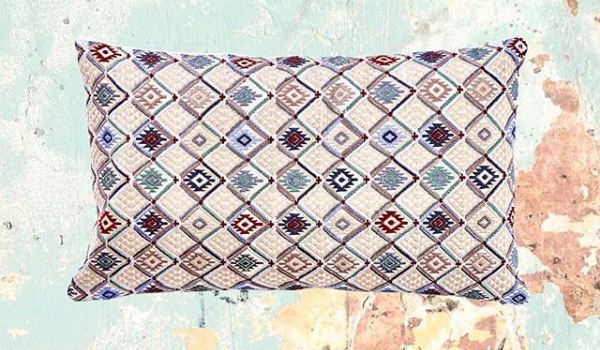
Justice Is Served
Nata y Limón pillow detailing the Mayan 'scorpion tail' motif
Like so many successful creative initiatives, Nata y Limón was born out of pure coincidence. After founders Anne and Marlene met in 2005 while studying tourism management in Germany, they both quit their full time marketing jobs independently of each other in search of a life more meaningful.
A Guatemalan woman wears a typical 'corte' skirt, intricately embroidered
Before long, they found what they were looking for in the rich textile culture of Guatemala. Creating sustainable job opportunities for local Mayan women and their indigenous communities, Nata y Limón celebrate local ancient weaving skills by producing top quality, timeless homeware textiles. Specialising in brocade, falseria and ikat weaving, many Mayan weavers are now reaping the benefits of Anne and Marlene's new craft initiative — and for anyone who remembers Tamay and Me at the Selvedge Fair in Charleston last year, you'll know that Nata y Limón aren't the only ones using textiles as a means of social justice.
Nata y Limón sheep wool blankets
With so many resources available to so many entrepreneurs these days (such as crowd-funding with Kickstarter, affordable travel, online communities like Facebook and co-op workspaces like Impact Hub) the opportunities to ditch the day job and stay true to your passion have never been so real. By nurturing the cross-pollination of ideas and backgrounds, immersing yourself in a creative network can play an integral role in developing new initiatives.
Colourful textiles drying in the Guatamalan sun
Nata y Limón have made full use of this diversity by surrounding themselves with similarly led social enterprises at Impact Hub. It was here at this co-working and events space where they built their business, after travelling through Guatemala together for the first time in 2016.
Marlene, one half of Nata y Limón. Photograph by Jorge Estuardo De León
On their journey, the founders met with a vibrant community of talented master weavers. Like in many cultures across the world, weaving skills in Guatemala are passed down from generation to generation — and have been for over 5,000 years. Girls as young as seven years old are often taught basic weaving techniques, and as a result over 1,000 different patterns and designs can be found in the clothes of the Mayan peoples. The ‘scorpion tail’ motif for instance (above), symbolises the tale of a scorpion piercing the clouds, welcoming rainfall onto the land giving nourishment to the people.
In the workshop
Now with Nata y Limón, the talented craftspeople behind these beautifully woven fabrics are gaining access to the global market. Collaborating with designers in Germany, Anne and Marlene are closing the gaps between worldwide communities devoted to craft, talent, and social enterprise. With a devoted online following and plenty of support for their initiative, their impact is only just beginning.







